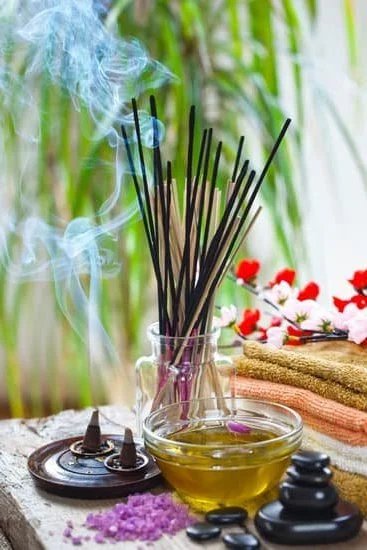Aromatherapy has been gaining increasing popularity as a natural and holistic approach to stress relief. Many people turn to aromatherapy as a way to promote relaxation, reduce anxiety, and enhance overall well-being. But why does aromatherapy work for stress? In this article, we will explore the science behind this ancient practice and discover how specific scents can impact our mood and emotions.
Aromatherapy is the therapeutic use of essential oils derived from plants. These oils are extracted from various parts of plants, such as flowers, leaves, bark, and roots, through processes like steam distillation or cold-press extraction. The resulting essential oils contain the volatile compounds that give each plant its unique scent and therapeutic properties.
When we inhale these aromatic compounds, they can stimulate our olfactory system and trigger different reactions in our brain. Certain scents have been found to have a direct impact on our limbic system – the area of the brain responsible for emotion and memory. This is why specific fragrances can evoke feelings of calmness, happiness, or even make us recall past memories associated with those scents.
Scientific research has shown that aromatherapy can have a positive effect on stress reduction. When we inhale certain essential oils, they can help regulate our autonomic nervous system – the part of our nervous system responsible for controlling stress responses. This regulation can lead to decreased heart rate, lowered blood pressure, reduced muscle tension, and an overall sense of relaxation.
In the following sections of this article, we will dive deeper into understanding how aromatherapy works for stress relief. We will explore the top essential oils recommended for managing stress, different methods and techniques for using them effectively, as well as case studies and personal experiences that highlight the effectiveness of aromatherapy in combating stress.
So if you’ve ever wondered why aromatherapy is so effective at relieving stress, keep reading to discover more about the science and power behind it.
Understanding the Link Between Aromatherapy and Stress Relief
Aromatherapy has been gaining increasing popularity as a natural and effective tool for stress relief. But what exactly is the link between aromatherapy and stress relief? How do specific scents impact our mood and emotions, and what is the science behind aromatherapy’s stress-reducing effects?
Certain scents have the ability to directly affect our emotions and mood. When we inhale these scents, they travel through our olfactory system and stimulate the limbic system in our brain, which is responsible for controlling emotions and memory. This stimulation can help to calm our minds, reduce anxiety, and promote relaxation.
The science behind aromatherapy’s stress reduction lies in the chemical reactions that occur when we inhale essential oils. For example, lavender oil contains compounds such as linalool and linalyl acetate, which have been found to have a calming effect on the nervous system. These compounds interact with receptors in the brain to produce feelings of relaxation and reduce stress levels.
Additionally, certain scents can also affect brain waves and neurotransmitters. Research has shown that inhaling certain essential oils can increase alpha brain waves, which are associated with a relaxed state of mind. These scents can also influence the release of neurotransmitters like serotonin and dopamine, which play a role in regulating mood and reducing anxiety.
The Top Aromatherapy Essential Oils for Stress Relief
Aromatherapy is a popular and effective method for relieving stress, and certain essential oils have been found to be particularly beneficial in promoting relaxation and calmness. Here are the top aromatherapy essential oils that can help with stress relief:
1. Lavender: Known as the ultimate stress-buster, lavender essential oil has a calming and soothing effect on the mind and body. It helps to reduce anxiety, improve sleep quality, and promote an overall sense of well-being.
2. Chamomile: Chamomile essential oil is well-known for its ability to promote relaxation and calmness. It helps to reduce irritability, anxious feelings, and insomnia. This gentle floral scent has a comforting effect on the nervous system.
3. Bergamot: Bergamot essential oil is known for its uplifting properties that can help alleviate mood swings and reduce anxiety. Its citrusy fragrance promotes feelings of freshness, positivity, and optimism.
4. Rosemary: Rosemary essential oil not only enhances mental clarity but also reduces tension and promotes relaxation. Its fresh herbal scent helps to clear the mind, improve focus, and relieve stress-related headaches.
These essential oils can be used individually or blended together to create personalized combinations that suit individual needs and preferences.
There are various methods of incorporating these essential oils into your daily routine for stress relief:
– Inhalation: The most common method is inhaling the scents directly from the bottle or using a diffuser. You can also add a few drops of essential oil to a tissue or handkerchief and inhale throughout the day.
– Massage: Combine touch with scent by adding a few drops of essential oil to carrier oil or lotion for a relaxing massage experience.
– Diffusion: Fill your environment with stress-relieving scents by using an aromatherapy diffuser or humidifier.
By using these top aromatherapy essential oils for stress relief through inhalation, massage, or diffusion, you can experience their calming and soothing effects on both the mind and body. Incorporating aromatherapy into your daily life is a natural and non-invasive approach to stress management that is safe and suitable for all ages.
Exploring Different Aromatherapy Methods and Techniques
Aromatherapy offers a wide range of methods and techniques for harnessing the power of scent to combat stress. Whether you prefer inhaling essential oils, receiving a massage with aromatic oils, or diffusing scents throughout your environment, there are many options to choose from. Each method has its own unique benefits and can be easily incorporated into your daily routine.
One of the most common and effective methods of aromatherapy is inhalation. This involves breathing in the scent of essential oils directly by using a diffuser, adding a few drops to a tissue or handkerchief, or simply smelling the oil from the bottle.
Inhalation allows the scent molecules to enter the bloodstream through the nasal passages, where they can travel to different areas of the body, including the brain. This direct interaction with the olfactory system can have profound effects on our emotions and overall sense of well-being.
Another popular aromatherapy technique is massage. By combining touch with scent, massage therapists can create a truly immersive experience that promotes relaxation and deeper stress relief. During an aromatherapy massage, essential oils are diluted in carrier oils and applied to the skin through various massage techniques. As you absorb these oils through your skin, they can penetrate deeply into your tissues and bloodstream, providing both physical and emotional benefits.
If you prefer a more passive approach to aromatherapy, diffusion may be the right method for you. Diffusion involves dispersing essential oil molecules into the air using a diffuser or other devices such as reed diffusers or nebulizers. This allows you to fill your environment with stress-relieving scents without needing direct contact with the oils. Diffusion is especially useful for creating a calming atmosphere in your home or workspace.
Benefits of Aromatherapy for Stress Management
Aromatherapy, the practice of using essential oils to promote physical and psychological well-being, has gained increasing popularity as a natural and effective method for stress relief. Its benefits are numerous, making it a valuable tool for managing stress in our daily lives.
One of the key advantages of aromatherapy for stress management is that it offers a natural and non-invasive approach to relaxation. Unlike pharmaceuticals or other interventions, aromatherapy relies on the power of plants and their essential oils to provide relief. This makes it an appealing alternative for those seeking holistic and gentle options for managing stress.
Another advantage of aromatherapy is its suitability for people of all ages. From infants to the elderly, aromatherapy can be safely used by individuals across different stages of life. Essential oils can be diluted properly and used in various forms, such as inhalation or topical application, depending on individual preferences and needs. This accessibility allows aromatherapy to reach a wide range of individuals seeking stress relief.
In addition, aromatherapy is easily incorporated into daily routines, making it an accessible option even for those with busy lifestyles. Whether through diffusing essential oils in the morning while getting ready for work or enjoying a relaxing bath infused with calming scents in the evening, integrating aromatherapy into daily life doesn’t require significant time or effort. It can seamlessly become part of one’s self-care regimen.
Furthermore, aromatherapy serves as a complementary therapy for anxiety and depression. Several studies have indicated that certain essential oils have mood-boosting properties that can help manage symptoms associated with these mental health conditions. Aromatherapy can be seen as an additional tool in the toolkit of those experiencing anxiety or depression, providing support alongside other traditional treatments.
Overall, the benefits of aromatherapy for stress management are compelling. Its natural approach, suitability for all ages, ease of incorporation into daily routines, and ability to complement existing therapies make it a powerful tool in the battle against stress. Whether you’re seeking relaxation, mental clarity, or emotional balance, aromatherapy can offer effective support on your journey to better well-being.
Case Studies and Personal Experiences of Aromatherapy’s Stress-Relieving Effects
Aromatherapy has gained significant popularity as a natural and effective method for managing stress. Many individuals have shared their personal experiences of finding relief from stress through the use of essential oils. These case studies and testimonials highlight the power of aromatherapy in promoting relaxation and emotional well-being.
Real-life stories showcase the effectiveness of aromatherapy in reducing stress levels. For instance, one individual shared how using lavender essential oil during times of high stress helped them feel calmer and more relaxed. Another person mentioned that chamomile oil was instrumental in alleviating anxiety symptoms and promoting a sense of tranquility. These personal accounts demonstrate that aromatherapy can be a valuable tool for individuals looking to combat stress.
Testimonials from individuals who have found relief through aromatherapy further emphasize its benefits. People have reported experiencing improved sleep quality, reduced tension, and overall enhanced well-being after incorporating aromatherapy into their daily routines. Many have expressed gratitude for the positive impact it has had on their mental health, helping them manage stress more effectively.
These case studies and personal experiences serve as evidence that aromatherapy can be an effective complementary therapy for stress management. While individual results may vary, the consistent theme is that aromatherapy has the potential to provide relief from stress and promote emotional balance.
Overall, these real-life stories and testimonials highlight the positive impact aromatherapy can have on individuals dealing with stress. By incorporating essential oils into their lives, people can experience various therapeutic effects such as relaxation, calmness, and improved mood. The power of aromatherapy lies in its ability to create a soothing environment and promote overall well-being in those seeking relief from everyday stresses.
Exploring the Science Behind Aromatherapy’s Stress-Reducing Effects
Aromatherapy has been used for centuries as a natural remedy for various ailments, including stress relief. But what is the science behind its effectiveness in reducing stress? This section will explore the chemical reactions and neurobiology behind aromatherapy’s stress-reducing effects, as well as how certain scents affect brain waves and neurotransmitters.
When we inhale the scent of an essential oil, it travels through our olfactory system and reaches the limbic system, which is responsible for regulating emotions, memories, and arousal. The molecules of these aromas interact with specific receptors in our brain, triggering chemical reactions that can promote relaxation and reduce stress.
One important aspect of aromatherapy’s stress-reducing effects is its impact on brain wave activity. Research has shown that certain scents can modulate electroencephalographic (EEG) activity, which measures brain wave patterns. For example, lavender essential oil has been found to increase theta and alpha brain waves, which are associated with deep relaxation and a calm mental state. Other aromas like bergamot and chamomile have been shown to enhance alpha brain wave activity as well.
Furthermore, aromatherapy can also influence neurotransmitters in the brain. For instance, studies have demonstrated that inhalation of lavender essential oil can increase the levels of serotonin – a neurotransmitter that plays a crucial role in regulating mood – in the brain. This increase in serotonin can contribute to a sense of relaxation and well-being.
Tips for Incorporating Aromatherapy Into Daily Life to Combat Stress
Aromatherapy can be a powerful tool in combating stress and promoting overall well-being. By incorporating aromatherapy into your daily routine, you can experience the soothing and calming effects of essential oils on both your mind and body. Here are some tips to help you incorporate aromatherapy into your daily life for effective stress management.
Creating a Relaxing Aromatherapy Routine at Home
One of the easiest ways to incorporate aromatherapy into your daily life is by creating a relaxing aromatherapy routine at home. Start by selecting essential oils that are known for their stress-relieving properties, such as lavender or chamomile.
You can use these oils in a variety of ways, such as diffusing them in an oil burner or adding a few drops to a warm bath. Taking time each day to relax and unwind with the scents of these essential oils can help reduce stress levels and promote a sense of calmness.
Using Essential Oils in the Workplace for Stress Management
Stress is not limited to our personal lives; it often follows us into our workplaces as well. To combat work-related stress, consider using essential oils in your office or workspace. You can keep a small bottle of essential oil on your desk and inhale it when you feel stressed or overwhelmed.
Alternatively, you can also use an aroma diffuser to fill your workspace with stress-relieving scents throughout the day. This can help create a more relaxed atmosphere and improve productivity.
Blending Scents for Personalized Stress Relief
Aromatherapy allows for endless possibilities when it comes to creating personalized blends for stress relief. Experiment with different combinations of essential oils that resonate with you personally. For example, if you find citrus scents uplifting, you may blend bergamot with other citrus oils like lemon or orange.
On the other hand, if earthy scents help you relax, you can try blending lavender with cedarwood or vetiver. By creating your own blends, you can tailor your aromatherapy experience to effectively combat stress and promote a sense of well-being.
Incorporating aromatherapy into your daily life is an easy and effective way to manage stress and improve overall mental health. Remember to choose high-quality essential oils, follow proper guidelines for usage, and listen to your body’s response to different scents. With regular practice, aromatherapy can become a valuable tool in coping with the daily stresses of life.
Conclusion
In conclusion, the power of aromatherapy for stress relief cannot be underestimated. As we have explored throughout this article, aromatherapy offers an effective and natural approach to managing stress and improving overall well-being. The link between specific scents and our mood is well-established, with essential oils such as lavender, chamomile, bergamot, and rosemary having proven effects on reducing stress, promoting relaxation, uplifting mood, and enhancing mental clarity.
Not only does aromatherapy offer a variety of essential oils to choose from for stress relief, but it also provides different methods and techniques that can be easily incorporated into our daily lives. Inhalation is the most common and effective method, allowing us to directly inhale the therapeutic scents. Massage combines touch and scent for deeper relaxation, while diffusion fills our environment with stress-relieving fragrances.
One of the main advantages of aromatherapy is its accessibility and suitability for all ages. It is a safe and non-invasive approach to stress management that can be easily integrated into our daily routines. Whether it involves creating a relaxing aromatherapy routine at home or using essential oils in the workplace for stress reduction, incorporating aromatherapy into our lives can bring about significant benefits.
The testimonials and case studies shared throughout this article highlight the real-life experiences of individuals who have found genuine relief through aromatherapy. Furthermore, recent research has shed light on the science behind these stress-reducing effects. Chemical reactions in our bodies and neurobiology play a significant role in how certain scents impact brain waves and neurotransmitters.
Frequently Asked Questions
What Does Aromatherapy Do for Stress?
Aromatherapy has been known to offer a range of benefits for stress relief. The use of certain essential oils can promote relaxation, calm the mind, and help alleviate anxiety and tension that may contribute to stress.
When inhaled or applied topically, these oils have the ability to stimulate the olfactory system and trigger positive emotional responses. Additionally, aromatherapy often involves massage techniques, which further aid in reducing stress by relieving muscle tension and promoting overall relaxation.
Is Aromatherapy Proven to Reduce Stress?
While there is anecdotal evidence suggesting that aromatherapy can reduce stress, more scientific research is needed to establish its efficacy. Some studies have shown promising results in terms of reducing stress symptoms through the use of specific essential oils such as lavender, chamomile, and bergamot.
However, due to the subjective nature of measuring stress and individual variations in response to aromatherapy, it is challenging to draw definitive conclusions on its effectiveness as a standalone treatment for stress reduction. Nonetheless, many people find aromatherapy to be a helpful complementary practice for managing stress alongside other self-care strategies.
What Aroma Reduces Stress?
Several aromas have been commonly associated with reducing stress levels. Lavender is one fragrance that is frequently used for its calming effects on both the mind and body. Its soothing scent is believed to promote relaxation and improve sleep quality.
Another aroma often used to reduce stress is citrus scents such as lemon or orange essential oil due to their uplifting properties and ability to boost mood. Meanwhile, ylang-ylang has been known for its potential ability to relieve anxiety and induce feelings of tranquility. It’s important to note that individual preferences may vary when it comes to choosing an aroma for stress reduction – what works well for one person may not have the same effect on another individual.

Are you looking for a natural way to improve your health and wellbeing?
If so, aromatherapy may be the answer for you.





